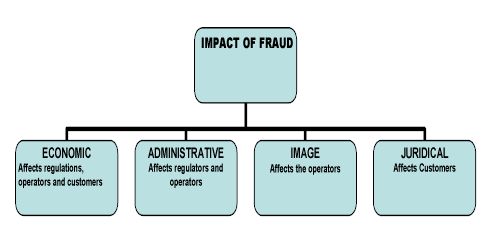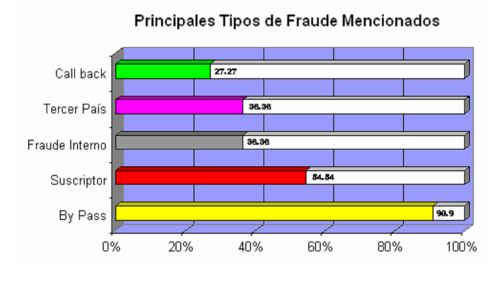|
General Impacts of Telecommunication Fraud

1. Impact on companies: when
fraud impacts principally on finances, image, and security of the
company, additionally the effect of increasing operative costs in
general converts this loss into higher prices for the end consumer.
2. Impact on the states: Normally,
in this case the state can be affected economically by not perceiving
or perceiving less income than projected, which are normally used to
provide communications to the more remote and most impoverished zones
in the countries, the aforementioned is due to non-payment of taxes or
contributions to redistribution funds to ensure the universality of
the service. Therefore in this case, the population in general will
be affected, since the states must use resources that could be
assigned to other social works, or in the worst case condemn the less
favored population to precarious services or simply none at all.
3. Impact on the users: When the
users of telecommunication services are affected economically or their
name is used unscrupulously to obtain telecommunication services and
later the deceived users must pay, or when their names are placed in
risk. Normally third parties obtain the service with the names of
users without their permission, infiltrate their networks processing
traffic that afterwards will be invoiced to their names, they use
services to commit other types of frauds and continue using their
names, and the users’ identities are placed at risk, and other
situations. Generally, any type of fraud will end up affecting the
pockets of the end users, because normally the operational losses
result in lower income, and possibly lower quality or higher prices.
The above mentioned impacts in each of
the divisions can be of the following nature:
Economical Impact: When the
impact is monetary and the companies, states and users have their
finances affected.
Administrative Impact: When the
companies, states and users need to employ their own resources for
administrative service such as attention to complaints, rights of
petition, loss of time in personal claims among others, in order to be
taken out of databases for undesired users, delinquent debtors, and
others.
Impact on Image: When the impact
contributes to the loss of image or standing, especially for companies
whose interests are damaged, when they are perceived by the public as
companies that participate in fraudulent activities to obtain income;
or in other cases when personal image is damaged because their names
are involved in unbudgeted debts, and can be included in credit risk
agency databases.
Juridical Impact: This type of
impact in many occasions is severe and can have an extremely negative
effect on any of the mentioned actors, but especially on the innocent
users in cases of identity theft, who must often go through tedious
juridical processes in order to prove their innocence, other cases
such as the Bypass, in which the identification of a local number as
that of a calling subscriber, have made innocent persons appear
implicated in cases about which they had no knowledge, when in truth
they were abroad.
IMPACT IN FIGURES
Regarding the impact figures, diverse
authors treat them in different manners.
A) As
a percentage of the doubtful collection portfolio: Depending on the
types of control that the companies have, it is calculated that from
10% to 50% of that portfolio is due to situations of fraud.
B) As
a percentage of income: We find that for the companies it can range
from 0.5% to 10% in companies have respectively very good controls and
practically no control.
C) There
are also global studies on the impact of fraud done by specialized
entities such as the Communications Fraud Control
Association (CFCA), which mentions
figures above 50 billion dollars for 2005, and with a growing tendency.
Additionally we share
the main classifications of fraud that occur in the sector, according
to the questionnaire results on “POLICIES AND BEST FRAUD CONTROL
PRACTICES FOR THE FIELD OF TELECOMMUNICATIONS” sent by CITEL to the
member countries
According to the
responses obtained by 13 organizations among companies, regulating
authorities, administrations of the CITEL member countries, the most
common type of fraud affecting Telecommunication services is the
Bypass, identified by 90.9% of the surveyed companies; other types of
fraud are the subscribers (54.54%), internal fraud (36.36%), and third
country (36.36%) (also called Re File, Re-origination), automatic call
back (27.27%), etc. The following graph illustrates these percentages.

In the cellular
telephone networks we find: Cloning of Cellular Telephones (90%),
subscriber fraud (50%) and stealing of terminals (10%).
With the objective of
giving continuity to this work, during the past PCC.I
held in Buenos Aires, Argentina, the holding of 6 regional workshops
on the subject, with the participation of experts was approved, with
the objective of making the sector in the Americas aware of the
subject of Fraud, and that will permit the creation o international
mechanisms of cooperation to fight against these scourges.
The workshops to be
held are the following:
-
Impacts of fraud on
the users, states and operators of the region.
-
Operator and
Supplier joint effort for the prevention of fraud.
-
Administrative and
Technological tools for the fight against fraud.
-
Interstate
mechanisms of mutual cooperation to minimize the effects of fraud.
-
International
organisms to study the subject, scope and manner of participation.
-
Toward appropriate
legislation, regulations and control for the fight against fraud.
The first workshop
will be held using audio teleconference with the Telefónica Telecom
platform in Colombia, where the interested parties must dial
57-1-5330909 ext 4055, or the option that we call you, for which the
participate party must register the number and the contact who will
call him on the conference day. The regulating authorities, operators
and users from each country will participate by gathering one place.
Dora Inés Moreno Castellanos
Intern Universidad Distrital,
Colombia.
Claudia Marcela Carrillo Herrera
Intern Universidad Distrital, Colombia
Giovani Mancilla Gaona
Rapporteur of the Rapporteur Group on Fraud Control in
Telecommunication Services – Fraud Control Manager, Telefónica Telecom
Colombia.
|

